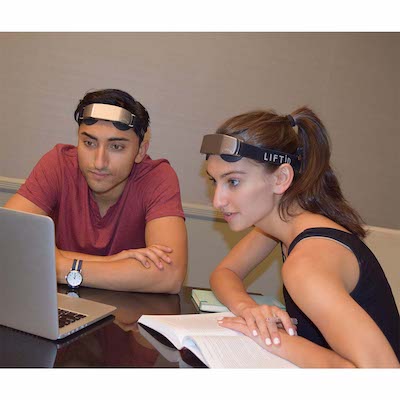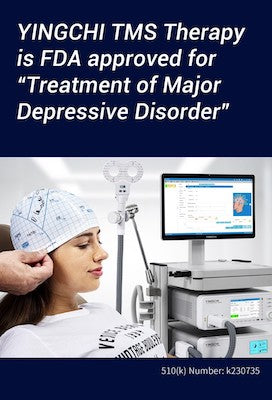-
Brain Ultimate TMS Earns FDA Clearance for OCD Treatment and Theta Burst Stimulation for Depression
Brain Ultimate TMS Receives FDA Clearance for OCD and Theta Burst Stimulation for MDD Caputron is proud to announce that the Brain Ultimate TMS system has received new FDA 510(k) clearances, expanding its clinical applications and further strengthening its position as a leader in non-invasive brain stimulation technology. The Brain Ultimate TMS system is now FDA-cleared for: Treatment of Obsessive-Compulsive Disorder (OCD) (K243459) Intermittent... -
tDCS Explained: How Transcranial Direct Current Stimulation Can Boost Brain Function and Recovery
Understanding tDCS: A Promising Tool for Brain Health and Performance Transcranial Direct Current Stimulation (tDCS) is a non-invasive brain stimulation technique that has captured growing interest in neuroscience, mental health, and even cognitive enhancement fields. Simple, safe, and supported by a wealth of emerging research, tDCS offers exciting possibilities for both clinical and personal use. What is tDCS? tDCS involves delivering a low-intensity electrical... -
Vagus Nerve Stimulation (VNS): Benefits, Applications, and How It Supports Brain and Body Health
Exploring Vagus Nerve Stimulation (VNS): A Breakthrough in Neuromodulation Vagus Nerve Stimulation (VNS) is a powerful and promising approach to enhancing brain and body health. Originally developed for treating epilepsy, VNS has gained broader recognition for its potential to improve mental health, regulate inflammation, and even support overall well-being. As research grows, so does the excitement around this remarkable technology. What is Vagus Nerve... -
What Is Cranial Electrotherapy Stimulation and How Can It Benefit You?
Cranial electrotherapy stimulation (CES) certainly sounds daunting. However, it can be a safe way to relieve the symptoms of some mental health and sleep conditions. As with any treatment, it’s always important to understand how CES technology works and its implications before deciding if it’s right for you. Join us as we explore how cranial electrotherapy stimulation works in addition to how a CES... -
LIFTiD Neurostimulation: A New Approach to Enhancing Cognitive Performance
Are you seeking a new way to help boost your brain besides caffeine or sugar? Or maybe you want to make sure you’re locked in when writing a paper or studying for an upcoming exam without relying on a few cups of coffee? No matter the case, when you need some extra help focusing, LIFTiD neurostimulation may be a good option. LIFTiD brain stimulation... -
Brain Ultimate TMS Receives FDA Approval as MDD Therapy
The Brain Ultimate TMS device is now FDA Approved to treat major depressive disorder (MDD). This is a significant step forward for TMS devices and their use as therapies for mental health conditions. Here’s what you should know about major depressive disorder and FDA clearance for treatment options. What Is Major Depressive Order? Major depressive disorder, or MDD, is a debilitating mood disorder. It’s... -
Tips and Best Practices for Using a tDCS Machine at Home
Do you have a tDCS device? Or do you want to try a tDCS device for the first time? If so, it’s important that you maximize the benefits you derive from it. Below, we explain how tDCS works and how you can get the most from home brain stimulation. What is tDCS? Transcranial direct current stimulation (tDCS) is a technique for stimulating areas of... -
The Best Transcranial Direct Current Stimulation Devices
Choosing a transcranial direct current stimulation (tDCS) device can be overwhelming. To help you find the right product, here’s a rundown of the best tDCS devices available at Caputron. What is tDCS? tDCS is a type of brain stimulation, or brain training. It uses low-level electrical currents to activate or inhibit activity in different areas of the brain. In other words, tDCS increases or... -
CES Treatment for Anxiety and Insomnia
Cranial electrotherapy stimulation (CES) is a therapeutic technique that can help boost your mood and make you feel more relaxed. But how does the treatment work, and is it right for you? Here’s how CES devices may be used to treat the symptoms of two common conditions – anxiety and insomnia. What Is a CES Stimulator? The electrical activity in our brain can control... -
Non-Invasive VNS Devices: A Beginner’s Guide to This Revolutionary Technology
The vagus nerve is one of the largest nerves in the human body. Vagus nerve stimulation (VNS) may help to improve your wellbeing. Here’s how non-invasive VNS devices work and why they might be helpful. What Is Non-Invasive Vagus Nerve Stimulation? Vagus nerve stimulation is a type of “neuromodulation”. Neuromodulation is a way to stimulate nerves to encourage them to behave in a certain...









